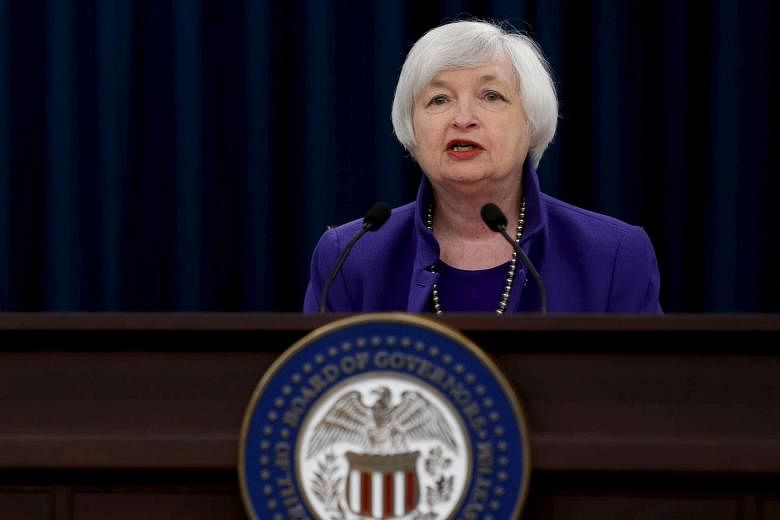WASHINGTON (BLOOMBERG) - Janet Yellen is preparing to walk a tightrope.
When the US Federal Reserve chair addresses lawmakers this week in Washington, she will have to strike a balance between sounding confident on the domestic economy and acknowledging increased risks from abroad. Two weeks after officials signaled interest rates may rise more slowly than previously expected, economists and investors will be trying to gauge Ms Yellen's willingness to delay tightening at the March meeting.
With financial market-turmoil causing uncertainty about the outlook, energy prices damping inflation and the European Central Bank preparing a stimulus boost that may bolster the US dollar, the market-implied probability for a rate increase next month has dropped to 10 per cent from more than 50 per cent at the start of the year. Policy makers including vice chairman Stanley Fischer have cautioned that it's still too soon to decide the next step.
"I don't think we should expect Yellen to throw the towel on a March hike," said Thomas Costerg, a senior US economist at Standard Chartered Bank in New York. "She may emphasize the positives in the US economy, particularly the still-strong labor market. Looking ahead, she may sound more cautious, and she will likely highlight that the negatives are mostly from abroad and that they are watching the global picture closely."
Ms Yellen is scheduled to appear before the House Financial Services Committee at 10 am on Wednesday and will address the Senate Banking Committee the next day. She'll have evidence to support the Fed's view that the US labor market remains solid and wages are showing signs of picking up.
Officials have softened their stance since the Fed raised interest rates in December for the first time in almost a decade and released forecasts showing that the median of officials' estimates expected policy tightening of 1 percentage point in 2016, probably spread over four quarter-point hikes.
US economic growth slowed in the fourth quarter as businesses cut back investment, raising concern that weakening global trade will damp or even interrupt one of the longest periods of continuous expansion since World War II. Oil prices are close to the lowest level since 2003.
At the heart of the concern about the world economy is China, where policy makers are battling the slowest growth in 25 years, the depreciation in the yuan to the lowest value in five years and an equity sell-off that shook global markets, tightening financial conditions from the US to Europe. The Standard & Poor's 500 Index is down 8 per cent this year, while the Stoxx Europe 600 Index has lost 11 per cent.
"Yellen will acknowledge that the tightening in financial conditions since the December meeting could have a negative impact on the growth and inflation outlook," said Steven Friedman, senior investment strategist at BNP Paribas Investment Partners in New York. "But so long as she continues to signal a bias to raise rates, her comments are unlikely to lead to a meaningful improvement in market sentiment."
Fed officials including Fischer, governor Lael Brainard and New York Fed chief William Dudley have cautioned that the impact of financial-market turbulence on the US economy is still unclear and needs careful monitoring. But Cleveland Fed President Loretta Mester said she continues to expect the US economy to warrant gradual interest-rate increases.
Lindsey Piegza, chief economist at Stifel Nicolaus & Co, said Yellen will use her congressional testimonies to defend the December liftoff and keep options open for March.
"I think she'll dig in her heels," Ms Piegza said. "She'll say they will keep an eye on equity markets and international developments, but say she expects the economy will continue to gain momentum."
American households are in a good position to bolster growth.
US non-farm payrolls were up 228,000 jobs a month on average in 2015 and rose 151,000 in January. Joblessness dropped to 4.9 per cent, a level the Fed considers equivalent to full employment. Average hourly earnings rose the most in a year - good news for officials anxious for inflation to accelerate toward their 2 per cent goal.
In Europe, the ECB is struggling to sustain a fragile economic recovery and has held out the prospect of more stimulus as early as March. Any cut in interest rates or an expansion of the 1.5 trillion-euro (S$2.35 trillion) quantitative-easing program will probably push up the US dollar, creating the same effect a Fed rate increase would have.
The Federal Open Market Committee announces its next policy decision on March 16, six days after the ECB.
"At the end of the day, it's going to come down to financial conditions, which means they won't know until right before the meeting," said Aneta Markowska, chief US economist at Societe Generale in New York.
Economic data may support a rate rise in March, she said. "The question is: Will the markets let them?"

